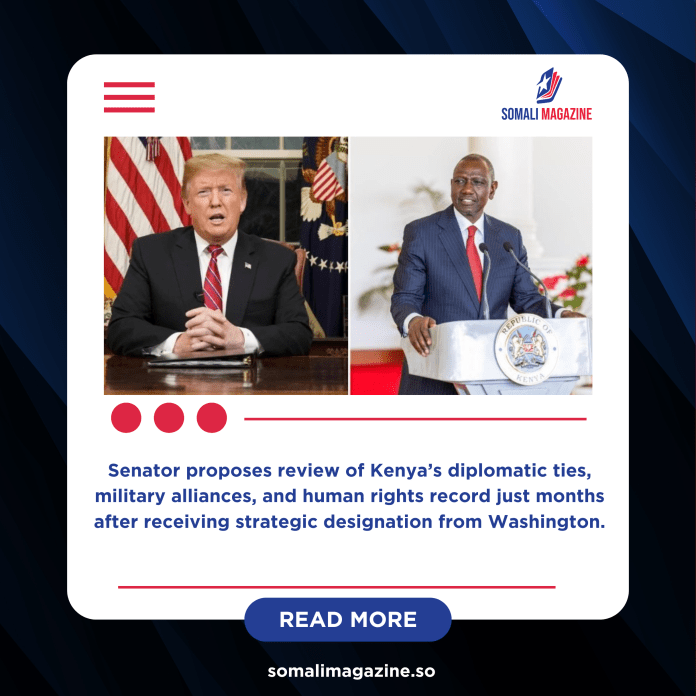Facebook Twitter (X) Instagram Somali Magazine - People's Magazine
The United States government is planning to review Kenya’s newly acquired non-NATO ally status, only a few months after it was officially granted. This move could affect the growing diplomatic and military relationship between the two countries.
Kenya became the first sub-Saharan African country to receive the designation of a Major Non-NATO Ally (MNNA) during President William Ruto’s state visit to Washington D.C. in May 2024. The title was officially given on June 24, 2024, and was seen as a major step in strengthening Kenya’s defense, security, and economic ties with the U.S.
However, the special status is now under scrutiny. U.S. Senator James Risch has proposed an amendment to the National Defense Authorization Act for the 2026 financial year that would require a formal review of Kenya’s MNNA designation. If the proposal is approved, the U.S. Secretary of State, Marco Rubio, will be tasked with carrying out the review and submitting a report to Congress within 180 days.
The review will focus on several key areas, including Kenya’s current foreign policy and its relationships with global powers such as China, Russia, and Iran. The U.S. wants to determine whether Kenya’s alliances and diplomatic decisions align with American interests. A section of the proposed amendment highlights the need for a “detailed description of Kenya’s military and security engagements” with China, Russia, and Iran since the designation was granted.
Another area of concern is Kenya’s possible involvement with armed groups. The review seeks to investigate whether the Kenyan government or any of its political leaders have financial or political links to militias such as the Somali-based terrorist group al-Shabaab and Sudan’s Rapid Support Forces (RSF).
The proposed amendment also raises human rights concerns. It calls for an investigation into whether the Kenyan government has used U.S. security or intelligence support to carry out unlawful activities like abductions, torture, or violence against civilians. The U.S. government wants to ensure that its support is not being misused for internal repression or human rights violations.
These investigations come at a time when Washington is paying closer attention to how its allies behave on the global stage. By granting a country MNNA status, the U.S. offers access to certain defense-related advantages, such as military training, equipment, and closer intelligence sharing. In return, the expectation is that the country will maintain a strong and supportive relationship with the U.S. and uphold democratic values.
The potential review could have serious consequences for U.S.-Kenya relations. If the findings raise concerns, there’s a possibility the MNNA status could be withdrawn or limited. This would be a major blow to Kenya’s efforts to position itself as a strategic partner of the U.S. in Africa.
Kenya’s foreign policy, especially its increasing ties with China in terms of infrastructure and development loans, may be a key factor in the review. Similarly, its positions on global conflicts and international diplomacy—especially regarding Russia and Iran—are likely to be closely evaluated.
The proposal has not yet been passed into law, but it signals a shift in how the U.S. views its partnership with Kenya. While the MNNA title was a sign of strong bilateral trust, this review could determine whether that trust will continue to hold.
As Kenya continues to grow in influence on the African continent, its relationships with global powers will remain under international observation—particularly by its allies in the West. The results of this review, if carried out, will likely shape the future of Kenya’s global alliances and its role as a regional power.

